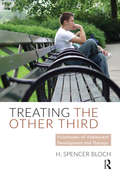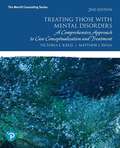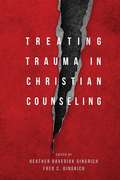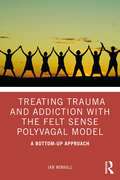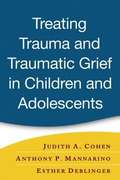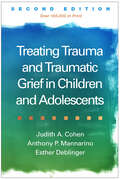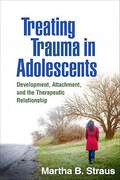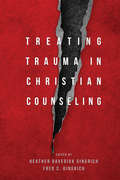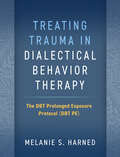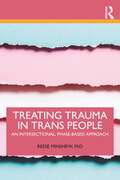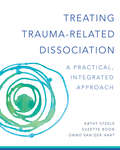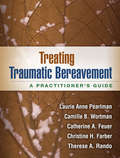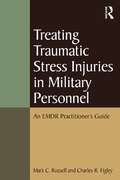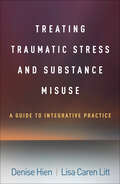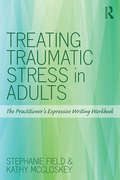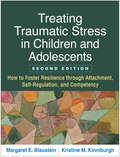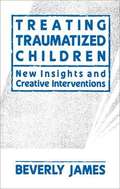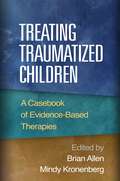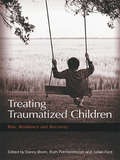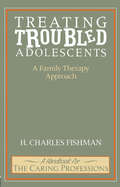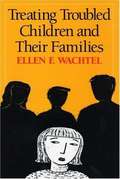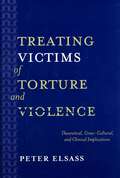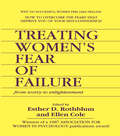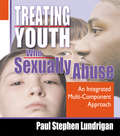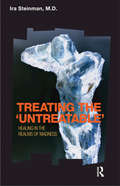- Table View
- List View
Treating The Other Third: Vicissitudes of Adolescent Development and Therapy
by H. Spencer BlochAs "evidence-based research" on psychodynamic psychotherapy for children and adolescents gains momentum, it seems to be following adult psychiatry in moving increasingly toward biomedical/genetic efforts to understand and treat psychopathology. In this process, the clinical developmental model, which traces development and much psychopathology to the interaction between children's endowment and environment, is being brushed aside in favor of genetic, biochemical and epidemiological efforts despite modest gains of clinical relevance to date from those approaches. As such, single case study continues to have an important place in identifying increasingly accurate clinical paradigms for understanding the development of psychopathology, which in turn leads toward developing more successful therapy. To this end, Treating the Other Third refers to that sizable minority of adolescent patients who fail to respond or refuse psychotropic medication.
Treating Those with Mental Disorders: A Comprehensive Approach to Case Conceptualization and Treatment
by Victoria E. Kress Matthew J. PayloThis book offers students and new counselors specific treatment planning, implementation, and intervention strategies in addition to background information on clinical issues and DSM-5 diagnoses and interventions. A strength-based framework for conceptualizing and treating clients guides students through the process of selecting and implementing treatments. Real-life examples illustrate how critical counseling concepts and approaches are applied in actual practice. Updated with current, evidence-based treatment techniques, a new chapter on culture and ethics, and even more applications and examples, this highly practical resource empowers counselors to thoughtfully and deliberately help their clients tackle complex issues and difficulties.
Treating Trauma In Christian Counseling (Christian Association For Psychological Studies Books)
by Heather Davediuk Gingrich Fred C. GingrichTraumatic experiences are distressingly common, and the risks of developing posttraumatic stress disorder are high. But in recent years the field of traumatology has grown strong, giving survivors and their counselors firmer footing than ever before to seek healing. <P><P>This book is a combined effort to introduce counseling approaches, trauma information, and Christian reflections to respond to the intense suffering people face. With extensive experience treating complex trauma, Heather Gingrich and Fred Gingrich have brought together key essays representing the latest psychological research on trauma from a Christian integration perspective. Students, instructors, clinicians, and researchers alike will find the following: <br>An overview of the kinds of traumatic experiences. <br>Coverage of treatment methods, especially those that incorporate spirituality. <br>Material to critically analyze as well as emotionally engage trauma. <br>Theoretical bases for trauma treatment and interventions. <br>References for further consideration and empirical research.
Treating Trauma and Addiction with the Felt Sense Polyvagal Model: A Bottom-Up Approach
by Jan WinhallIn sharp contrast with the current top-down medicalized method to treating addiction, this book presents the felt sense polyvagal model (FSPM), a paradigm-shifting, bottom-up approach that considers addiction as an adaptive attempt to regulate emotional states and trauma. The felt sense polyvagal model draws from Porges' polyvagal theory, Gendelin's felt sense, and Lewis' learning model of addiction to offer a graphically illustrated and deeply embodied way of conceptualizing and treating addiction through supporting autonomic regulation. This model de-pathologizes addiction as it teaches embodied practices through tapping into the felt sense, the body’s inner wisdom. Chapters first present a theoretical framework and demonstrate the graphic model in both clinician and client versions and then teach the clinician how to use the model in practice by providing detailed treatment strategies. This text’s informed, compassionate approach to understanding and treating trauma and addiction is adaptable to any school of psychotherapy and will appeal to addiction experts, trauma specialists, and clinicians in all mental health fields.
Treating Trauma and Traumatic Grief in Children and Adolescents
by Judith Cohen Anthony MannarinoThis is one of the first books to present a systematic treatment approach, grounded in cognitive-behavioral therapy, for traumatized children and their families. Provided is a comprehensive framework for assessing posttraumatic stress disorder, depression, anxiety, and other symptoms; developing a flexible, individualized treatment plan; and working collaboratively with children and parents to build core skills in such areas as affect regulation and safety. Specific guidance is offered for responding to different types of traumatic events, with an entire section devoted to grief-focused components. Also addressed are ways to tailor treatment to children's varying developmental levels and cultural backgrounds. The authors' approach has been nationally recognized as an exemplary evidence-based program.
Treating Trauma and Traumatic Grief in Children and Adolescents, Second Edition
by Anthony P. Mannarino Esther Deblinger Judith A. CohenThis authoritative guide has introduced many tens of thousands of clinicians to Trauma-Focused Cognitive-Behavioral Therapy (TF-CBT), a leading evidence-based treatment for traumatized children and their parents or caregivers. Preeminent clinical researchers provide a comprehensive framework for assessing posttraumatic stress disorder (PTSD), other trauma-related symptoms, and traumatic grief in 3- to 18-year-olds; building core coping skills; and directly addressing and making meaning of children's trauma experiences. Implementation is facilitated by sample scripts, case examples, troubleshooting tips, and reproducible client handouts. Purchasers get access to a Web page where they can download and print the reproducible materials in a convenient 8 1/2" x 11" size. TF-CBT is listed in SAMHSA's National Registry of Evidence-Based Programs and Practices. New to This Edition *Incorporates a decade's worth of advances in TF-CBT research and clinical practice. *Updated for DSM-5. *Chapter on the model's growing evidence base. *Chapter on group applications. *Expanded coverage of complex trauma, including ways to adapt TF-CBT for children with severe behavioral or affective dysregulation. See also the edited volume Trauma-Focused CBT for Children and Adolescents: Treatment Applications for more information on tailoring TF-CBT to children's varying developmental levels and cultural backgrounds.
Treating Trauma in Adolescents: Development, Attachment, and the Therapeutic Relationship
by Martha B. StrausThis book presents an innovative and empathic approach to working with traumatized teens. It offers strategies for getting through to high-risk adolescents and for building a strong attachment relationship that can help get development back on track. Martha B. Straus draws on extensive clinical experience as well as cutting-edge research on attachment, developmental trauma, and interpersonal neurobiology. Vivid case material shows how to engage challenging or reluctant clients, implement interventions that foster self-regulation and an integrated sense of identity, and tap into both the teen's and the therapist's moment-to-moment emotional experience. Essential topics include ways to involve parents and other caregivers in treatment.
Treating Trauma in Christian Counseling (Christian Association for Psychological Studies Books)
by Heather Davediuk Gingrich; Fred C. Gingrichan overview of the kinds of traumatic experiencescoverage of treatment methods, especially those that incorporate spiritualitymaterial to critically analyze as well as emotionally engage traumatheoretical bases for trauma treatment and interventionsreferences for further consideration and empirical research
Treating Trauma in Dialectical Behavior Therapy: The DBT Prolonged Exposure Protocol (DBT PE)
by Melanie S. HarnedMany DBT clients suffer from posttraumatic stress disorder (PTSD), but until now the field has lacked a formal, tested protocol for exactly when and how to treat trauma within DBT. Combining the power of two leading evidence-based therapies--and designed to meet the needs of high-risk, severely impaired clients--this groundbreaking manual integrates DBT with an adapted version of prolonged exposure (PE) therapy for PTSD. Melanie S. Harned shows how to implement the DBT PE protocol with DBT clients who have achieved the safety and stability needed to engage in trauma-focused treatment. In a convenient large-size format, the book includes session-by-session guidelines, rich case examples, clinical tips, and 35 reproducible handouts and forms that can be downloaded and printed for repeated use.
Treating Trauma in Trans People: An Intersectional, Phase-Based Approach
by Reese MinshewTreating Trauma in Trans People brings together key concepts from both gender-affirming treatment and trauma-focused care, with interventions focused on resolving physiological, intrapsychic, and interpersonal disruptions. Symptoms related to trauma and stress manifest in bodies, psyches, and interpersonal interactions. Gender, too, is impacted by bodies, psyches, and interpersonal interactions. With chapters that focus on each of these domains, this book provides a framework for clinicians eager to provide trauma-informed, gender-inclusive care. The book then broadens the lens to the systemic, acknowledging the limits of individual interventions when located within a larger framework of systemic oppression and asking clinicians to consider liberation and justice as treatment goals.
Treating Trauma-Related Dissociation: A Practical, Integrative Approach (Norton Series on Interpersonal Neurobiology #0)
by Onno Van Hart Suzette Boon Kathy SteeleEstablishing safety and working with dissociative parts in complex trauma therapy. Therapists around the world ask similar questions and struggle with similar challenges treating highly dissociative patients. This book arose not only out of countless hours of treating patients with dissociative disorders, but also out of the crucible of supervision and consultation, where therapists bring their most urgent questions, needs, and vulnerabilities. The book offers an overview of the neuropsychology of dissociation as a disorder of non-realization, as well as chapters on assessment, prognosis, case formulation, treatment planning, and treatment phases and goals, based on best practices. The authors describe what to focus on first in a complex therapy, and how to do it; how to help patients establish both internal and external safety without rescuing; how to work systematically with dissociative parts of a patient in ways that facilitate integration rather than further dissociation; how to set and maintain helpful boundaries; specific ways to stay focused on process instead of content; how to deal compassionately and effectively with disorganized attachment and dependency on the therapist; how to help patients integrate traumatic memories; what to do when the patient is enraged, chronically ashamed, avoidant, or unable to trust the therapist; and how to compassionately understand and work with resistances as a co-creation of both patient and therapist. Relational ways of being with the patient are the backbone of treatment, and are themselves essential therapeutic interventions. As such, the book also focused not only on highly practical and theoretically sound interventions, not only on what to do and say, but places strong emphasis on how to be with patients, describing innovative, compassionately collaborative approaches based on the latest research on attachment and evolutionary psychology. Throughout the book, core concepts—fundamental ideas that are highlighted in the text in bold so they can be seen at a glance—are emphasized. These serve as guiding principles in treatment as well as a summing-up of many of the most important notions in each chapter. Each chapter concludes with a section for further examination. These sections include additional ideas and questions, exercises for practicing skills, and suggestions for peer discussions based on topics in a particular chapter, meant to inspire further curiosity, discovery, and growth.
Treating Traumatic Bereavement: A Practitioner's Guide
by Laurie Anne Pearlman Christine H. Farber Camille B. Wortman Catherine A. Feuer Therese A. RandoThis book presents an integrated treatment approach for those struggling to adapt after the sudden, traumatic death of a loved one. The authors weave together evidence-based clinical strategies grounded in cutting-edge knowledge about both trauma and grief. The book offers a clear framework and many practical tools for building survivors' psychological and interpersonal resources, processing their trauma, and facilitating mourning. In a large-size format for easy photocopying, the book includes over 30 reproducible handouts. Purchasers can access a companion website to download and print these materials as well as supplemental handouts and a sample 25-session treatment plan. Winner (Second Place)--American Journal of Nursing Book of the Year Award, Psychiatric and Mental Health Nursing Category
Treating Traumatic Stress Injuries in Military Personnel: An EMDR Practitioner's Guide (Psychosocial Stress Series)
by Charles R. Figley Mark C. RussellTreating Traumatic Stress Injuries in Military Personnel offers a comprehensive treatment manual for mental health professionals treating traumatic stress injuries in both male and female veterans. It is the first book to combine the most recent knowledge about new paradigms of combat-related traumatic stress injuries (Figley & Nash, 2006) and offers a practical guide for treating the spectrum of traumatic stress injuries with EMDR, which has been recognized by the Department of Veterans Affairs and Department of Defense clinical practice guidelines as one of the most studied, efficient, and particularly well-suited evidence-based treatments for military-related stress injuries. Russell and Figley introduce an array of treatment innovations designed especially for use with military populations, and readers will find pages filled with practical information, including appendices that feature a glossary of military terminology, breakdowns of rank and pay grades, and various clinical forms.
Treating Traumatic Stress and Substance Misuse: A Guide to Integrative Practice
by Denise Hien Lisa Caren LittFrom pioneering clinician-researchers, this book provides crucial guidance for treating co-occurring concerns that virtually all therapists are likely to encounter--and many feel ill equipped to handle. Denise Hien and Lisa Caren Litt review the landscape of evidence-based treatments for posttraumatic stress disorder (PTSD), other trauma-related problems, and substance misuse, and present an integrative, culturally responsive framework for assessment and treatment planning. The book shows the clinician how to navigate the complexities of the treatment process while tailoring interventions flexibly and collaboratively to each client's needs. Rich clinical examples include two extended cases that run throughout the chapters. The companion website features several reproducible clinical tools and a comprehensive resource list.
Treating Traumatic Stress in Adults: The Practitioner’s Expressive Writing Workbook
by Stephanie Field Kathy McCloskeyTreating Traumatic Stress in Adults is a resource for therapists of all disciplines for use in the treatment of adults suffering from post-traumatic stress. By reading this unique synthesization of information on the most current trauma treatments and expressive writing exercises, practitioners will gain an integrative and practical set of tools for treating post-traumatic stress. Also included are numerous diverse case vignettes, exercises for building trust in the patient/client relationship, and sections dedicated to exploring the client’s thought patterns and emotions to provide an opportunity for exposure, healing, and restructuring maladaptive beliefs.
Treating Traumatic Stress in Children and Adolescents, Second Edition: How to Foster Resilience through Attachment, Self-Regulation, and Competency
by Margaret E. Blaustein Kristine M. KinniburghTens of thousands of clinicians have used this book--now revised and expanded with 50% new material--to plan and organize effective interventions for children and adolescents who have experienced complex trauma, as well as their parents and other caregivers. The Attachment, Regulation, and Competency (ARC) framework can be used in a wide range of settings to strengthen child–caregiver relationships and support healthy development and positive functioning. Packed with case vignettes and user-friendly clinical tools, the volume identifies key treatment goals and provides flexible intervention strategies and skills. In a large-size format with lay-flat binding for easy photocopying, the book includes 79 reproducible handouts and forms. Purchasers get access to a Web page where they can download and print the reproducible materials. New to This Edition *Reflects the ongoing development of ARC, including important refinements to foundational strategies and treatment targets. *More than 30 additional handouts and worksheets; all reproducible tools are now downloadable. *Greater attention to caregiver skill development throughout. *Addresses ways ARC is being used in nontraditional settings (schools, day care, primary care practices) as well as diverse clinical contexts. See also Treating Adult Survivors of Childhood Emotional Abuse and Neglect, by Elizabeth K. Hopper, Frances K. Grossman, Joseph Spinazzola, and Marla Zucker, which presents a complementary approach also developed at The Trauma Center at Justice Resource Institute.
Treating Traumatized Children
by Beverly JamesListening to a small child describe a parent's murder can tax the most seasoned professional. Cases of physical and sexual abuse where trauma was deliberately inflicted can particularly challenge a practitioner's defenses. Treating Traumatized Children's the first handbook to provide specific guidance and tools for treating children who have been traumatized by physical and sexual abuse, disaster, divorce, or witnessing violent events. This book will provide helping professionals with a clear blueprint for assessing the impact of trauma and developing specific treatment plans. Beverly James, a specialist in evaluating and treating traumatized children, outlines creative exercises and techniques that will enable clinicians to join with children in slowly and carefully reviewing their experiences and helping them understand and accept their feelings related to the trauma. Art, play, and drama techniques, among others, are presented in a sophisticated yet straightforward style, useful to clinicians with specialized training in such techniques or those using them for the first time.
Treating Traumatized Children
by Brian Allen Mindy KronenbergFeaturing extensive case studies, this volume provides a unique window into implementation of evidence-based treatments in real-world community settings. Experienced therapists illustrate the use of three effective therapies for traumatized children and their caregivers: trauma-focused cognitive-behavioral therapy (TF-CBT), child-parent psychotherapy (CPP), and parent-child interaction therapy (PCIT). Covering the entire process of assessment and intervention, the cases highlight ways to maintain treatment fidelity while addressing complex clinical challenges with diverse clients. Experts in the respective therapy models offer instructive commentaries at the end of each case. The book also provides a concise introduction to each model, including its theoretical underpinnings, empirical support, and applications.
Treating Traumatized Children: Risk, Resilience and Recovery
by Julian D. Ford Danny Brom Ruth Pat-HorenczykWhile recent years have seen a vast increase in the literature on adult trauma, interest in childhood trauma has only recently started to gain momentum, encouraging new research and evidence-based interventions. Here the editors have brought together an international list of contributors to look at both innovative and established treatments of trauma in a range of contexts, and provide up-to-date coverage of what is on offer in prevention, assessment, treatment and research. Divided into three parts, main topics discussed are: risk and protective factors for the development of post-traumatic disorders conceptualizations of resilience and suggestions for making them operational evidence-based treatment models for traumatized children Treating Traumatized Children provides professionals with an up-to-date international perspective on the subject, as well as helping professionals and researchers develop future treatments based on current evidence.
Treating Troubled Adolescents: A Family Therapy Approach
by H. Charles FishmanFirst Published in 2017. Routledge is an imprint of Taylor & Francis, an Informa company.
Treating Troubled Children and their Families
by Ellen F. WachtelIntegrating systemic, psychodynamic, and cognitive-behavioral perspectives, this acclaimed book presents an innovative framework for therapeutic work. Ellen Wachtel shows how parents and children all too often get entangled in patterns that cause grief to both generations, and demonstrates how to help bring about change with a combination of family-focused and child-focused interventions. Vivid case examples illustrate creative ways to engage young children in family sessions and conduct complementary sessions with children and parents alone, using a variety of strengths-based, developmentally informed strategies. The paperback edition features a new preface in which the author reflects on the continuing evolution of her approach.
Treating Victims of Torture and Violence: Theoretical Cross-Cultural, and Clinical Implications
by Peter ElsassTorture is among the most disturbing and psychologically devastating of human behaviors. It dehumanizes its victims, leaving them with serious and lasting psychological wounds. Like other psychological trauma, torture frequently leaves in its wake denial and silence among both perpetrators and their victims. This communicative void creates a public and mental block that can make treatment of torture survivors very difficult. Treating Victims of Torture and Violence is the definitive manual for therapists treating victims of torture, prisoners of war, and casualties of forced migration. Divided into five sections dealing with basic concepts of torture--violence and aggression, the torture syndrome, psychotherapeutic treatment, the cultural psychology of torture syndrome, and cultural psychological treatment-- Treating Victims of Torture and Violence employs both classic psychoanalytic and cognitive- behavioral methods. Realizing that torture victims are frequently from different cultures than those of their therapists, Peter Elsass provides in-depth aid to therapists dealing with a multicultural clientele.
Treating Women's Fear of Failure: From Worry to Enlightenment
by Ellen Cole Esther D RothblumThis new book looks at an important issue--the emotional impact of success upon women--at a time when opportunities are more available to them than ever before. Using research, clinical experience, and personal anecdotes, the contributors examine the timely issues of women and worry, women's sense of their own entitlement, fear of success and fear of failure, and women's impostor feelings. The dilemma that feminist therapists frequently experience of encouraging women clients, often superbly qualified in their fields, to take a risk that might involve rejection or failure, is highlighted here. Therapists will recognize the often expressed fears of academic and intellectual failure, as well as the fears of various interpersonal failures that result from a combination of women's opportunities in society as well as socialization.
Treating Youth Who Sexually Abuse: An Integrated Multi-Component Approach
by Stephen LundriganA comprehensive program of treatment for adolescent sex offenders! Covering every phase from assessment to relapse prevention, this valuable book offers specific suggestions and backs them with the latest research as well as years of clinical experience. Treating Youth Who Sexually Abuse: An Integrated Multicomponent Approach is a training tool, reference book, and field manual for the use of therapists, administrators, and everyone involved with the assessment, treatment, and placement of sexually abusive youth. Beginning with a broad view of the continuum of programs available and the structure of the service-delivery system that provides treatment, Treating Youth Who Sexually Abuse continues with specifics of program policy and design in both outpatient and inpatient settings. From choice of client to aftercare, the book covers the specifics of pretreatment, various modalities of therapy, inpatient and outpatient programs, and relapse-prevention programs. The foundations of program structure and the specific components (such as family therapy, group therapy, milieu treatment) are integrated to make a powerful, flexible, and above all effective treatment tool. Treating Youth Who Sexually Abuse offers practical advice and help for therapists and administrators, including: ready-to-use treatment materials reproducible group curricula sample schedules for full-day treatment and afterschool programs discussions of staff training and administrative concerns information on liability issues ideas for coordinating care with other treatment providersTreating Youth Who Sexually Abuse: An Integrated Multicomponent Approach is an essential training tool for students, a field manual for professionals, and a reference book for everyone interested in sex offence-specific treatment for youth. With case studies, diagnostic criteria, helpful tables and diagrams, listings of organizations in the field and Web addresses, this volume deserves a permanent place on your professional bookshelf.
Treating the 'Untreatable': Healing in the Realms of Madness
by Ira SteinmanTreating the 'Untreatable' offers the hope of recovery, healing and cure for the most severe psychotic disturbances, schizophrenia and delusional disorder. Through a psychotherapeutic exploration of hallucinations, delusions and thought disorder, even the most hopeless and "untreatable" patients have a chance for returning to a life of relationships and function even after years, if not decades, of disturbance. These studies in the intensive psychotherapy of schizophrenia and delusional disorders demonstrate that recovery, healing and cure can be achieved in those most disturbed. In this era of treating schizophrenic and delusional patients with a primarily antipsychotic drug oriented approach, a more thorough exploration of the meaning to the patient of his psychosis - with judicious antipsychotic use, when indicated - leads to internal character and external behavioral change that is far more lasting than with antipsychotic use alone. With such a psychodynamic approach, some of these previously chaotic, disturbed and heavily medicated people were able to understand the symbolism and the origin of their psychotic productions and go off antipsychotic medication altogether.
